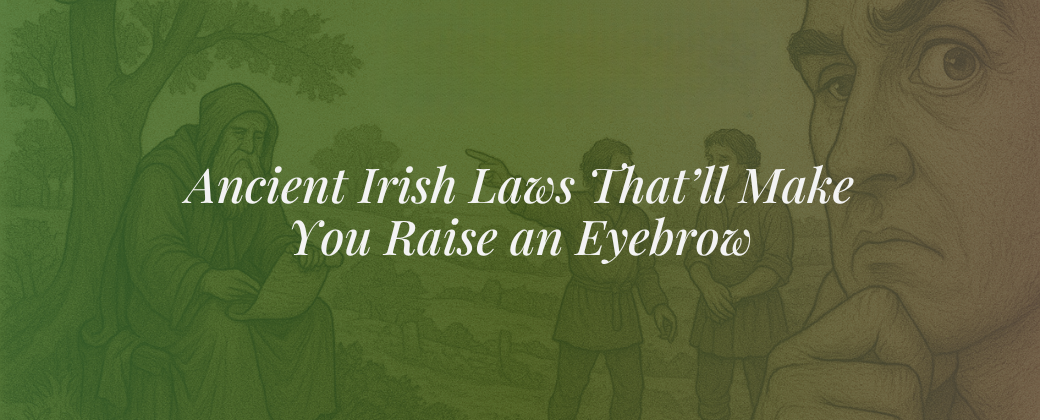Ancient Irish Laws That’ll Make You Raise an Eyebrow

Long before modern courts and judges roamed the Irish hills, ancient Ireland had its own homegrown legal system called Brehon Law. It was around for over 1,000 years way before the English common law crept in. The laws were administered not by a king or a cop, but by professional legal scholars known as Brehons. These weren’t folks who handed down punishments they were more like neutral referees, helping people sort out their problems peacefully.
But here’s where it gets wild Brehon Law had rules that make today’s systems look, well... pretty dull.
1. Compensation for Insults – There's a Price for Shade
In ancient Ireland, if you insulted someone, you didn’t just say “oops” and move on. You actually had to pay a fine based on how bad the insult was and who you said it to.
The fine could be cows, silver, or even butter. If you said something rude to a poet, get ready to pay big because poets were a big deal, ranked almost like modern celebrities.
And get this: there was even a hierarchy of insults, each with its own going rate!
2. Bee Justice – Yes, You Could Sue a Hive
If your neighbor’s bees stung you or your livestock or even snuck into your home to raid your honey you could actually take legal action. Bee disputes were serious business!
The law went so far as to define how much honey you could take, what to do if a swarm moved into your land, and how many bees you owed someone if your bees attacked their animals.
There was even a “bee truce” law that stated bees had to be returned to their rightful owner unharmed if caught trespassing.
3. Marriage... With Options
Forget the “one man, one woman” setup. Under Brehon Law, relationships were a bit more flexible.
There were nine types of union, from equal partnerships to arrangements where one person brought all the goods and the other brought, well... just themselves. There were even rules for cohabitation, trial marriages, and what happened if couples broke up.
And yep divorce was allowed, and quite fair. Property was divided based on who brought what into the relationship. Ireland was progressive like that.
4. Satire Could Ruin You, Literally
In ancient Ireland, satire wasn’t just funny it was feared. A talented poet could write a sharp verse that might ruin your reputation overnight. It was believed that satire could even cause facial blemishes or boils out of shame. Wild, right?
So, insulting a poet or refusing to pay them? Big mistake. You risked not just legal trouble, but total public humiliation via a savage poem.
5. Drunk on the Job? You're Paying For It
Brehon Law didn’t mess around when it came to responsibility. If you were drunk and messed something up like a blacksmith ruining a sword or a herder losing cattle you had to pay full compensation.
The logic? You weren’t fit to be working in the first place.
Same went for doctors. If a healer botched a treatment while drunk, they owed the patient big time. Yep, malpractice laws existed way before modern lawyers.
6. Borrowing Tools? Better Not Break 'Em
Say you borrowed your neighbor’s plow and accidentally broke it. In ancient Ireland, the laws were very clear: you had to replace or repair the item, even if the damage wasn’t your fault.
This rule came under a principle called ‘gessi’ sacred obligations tied to honor and fairness.
And if you failed to fix it, your community might even shame you publicly until you did.
7. No King Above the Law
One of the most eyebrow-raising facts? Even kings had to follow Brehon Law. That’s right the law applied to everyone, no matter how high up the social ladder you were.
If a king messed up or treated people unfairly, poets, druids, and Brehons could call him out and he could be deposed for breaking his oaths.
That’s way more democratic than many parts of the world at that time.
8. Legal Protection for Trees and Animals
Believe it or not, trees had legal status. Certain species like oaks, yews, and hazels were considered “nobles of the forest.” Cutting one down without good reason could land you in serious legal trouble.
Animals like cows and even birds were also protected, and harming them could mean fines or community service.
These laws reflected how deeply connected the Irish were to nature. You didn’t just own the land you respected it.
🧠 FAQs – You’re Probably Wondering…
Q: Were these laws actually written down?
Yes! The laws were first oral, but were later recorded in texts like the Senchus Mór around the 7th century.
Q: Who were the Brehons?
They were respected legal scholars, often born into the profession, trained from youth, and known for being neutral and fair.
Q: When did Brehon Law end?
It started to decline after the Norman invasion and was eventually replaced by English common law but traces of it lingered for centuries.
Q: Was it really that fair?
Surprisingly, yes. While not perfect by today’s standards, Brehon Law was relatively progressive, especially in property rights and women’s rights.
So, yeah ancient Irish law wasn’t just a dry list of dos and don’ts. It was a rich, dynamic system rooted in fairness, honor, and a pinch of sass. From bee rights to poetic revenge, the Brehon Laws were centuries ahead of their time and honestly, kind of brilliant.
If anything, they show us that law doesn’t have to be boring. It can be creative, compassionate, and yes, a little strange.
So next time someone says history is dull, hit 'em with some bee litigation or insult fines. That'll raise a few eyebrows.














